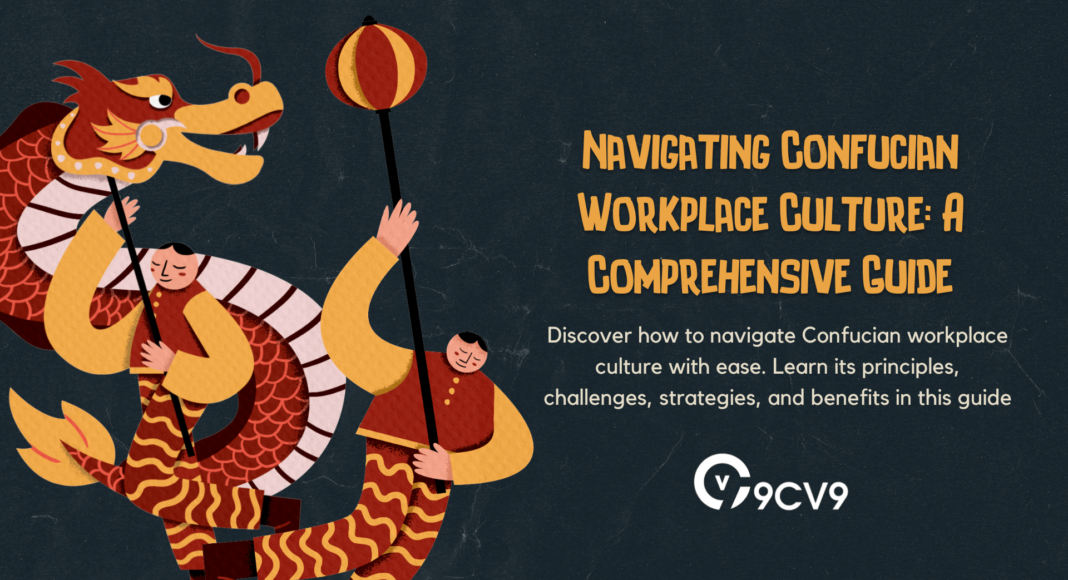Key Takeaways
- Understand Hierarchy and Respect: Confucian workplace culture emphasizes respect for seniority and clear hierarchical structures, promoting order and effective leadership.
- Foster Strong Relationships: Prioritize harmony, trust, and collective success to build cohesive teams and long-lasting professional bonds in Confucian workplaces.
- Adapt to Cultural Norms for Success: Embrace Confucian values like ethical leadership and mutual respect to enhance productivity, minimize conflicts, and strengthen cross-cultural business relationships.
In today’s globalized economy, understanding diverse workplace cultures is more important than ever.
Among the myriad of cultural influences shaping professional environments, Confucian workplace culture stands out as a cornerstone in many East Asian countries, including China, South Korea, Japan, and Vietnam.
Rooted in the ancient teachings of Confucius, this philosophy has transcended centuries to become a guiding framework for organizational behavior, leadership, and interpersonal relationships.
For professionals working in or with Confucian-influenced environments, grasping its principles is not just beneficial—it is essential.

Confucian workplace culture revolves around core values such as respect for hierarchy, harmony, and moral integrity.
These principles are deeply ingrained in both personal and professional interactions, influencing how employees communicate, collaborate, and make decisions.
However, navigating this cultural landscape can be challenging, particularly for individuals from Western or non-Confucian backgrounds.
Misunderstandings and cultural missteps are common, often stemming from differences in how authority, relationships, and individualism are perceived and prioritized.
As businesses become increasingly interconnected, the ability to adapt to Confucian workplace norms can offer a significant competitive advantage.
Whether you’re a manager overseeing a multinational team, a professional relocating to East Asia, or simply someone looking to enhance cross-cultural competence, understanding this cultural framework can lead to stronger relationships, smoother collaborations, and greater professional success.
This comprehensive guide aims to demystify Confucian workplace culture by exploring its historical roots, fundamental principles, and practical applications.
It will delve into key aspects such as hierarchy, respect, relationship-building, and harmony, providing actionable strategies to navigate these elements effectively.
Furthermore, it will examine the challenges faced by foreign professionals and offer insights into balancing Confucian traditions with modern workplace dynamics.
By the end of this guide, you will gain a deeper appreciation of how Confucian values influence professional environments and learn how to integrate these principles into your approach.
Whether you’re stepping into a Confucian workplace for the first time or seeking to strengthen your cross-cultural skills, this guide is your roadmap to success in navigating one of the most enduring and influential cultural paradigms in the world.
Before we venture further into this article, we would like to share who we are and what we do.
About 9cv9
9cv9 is a business tech startup based in Singapore and Asia, with a strong presence all over the world.
With over eight years of startup and business experience, and being highly involved in connecting with thousands of companies and startups, the 9cv9 team has listed some important learning points in this overview of Navigating Confucian Workplace Culture.
If your company needs recruitment and headhunting services to hire top-quality employees, you can use 9cv9 headhunting and recruitment services to hire top talents and candidates. Find out more here, or send over an email to [email protected].
Or just post 1 free job posting here at 9cv9 Hiring Portal in under 10 minutes.
Navigating Confucian Workplace Culture: A Comprehensive Guide
- Understanding the Foundations of Confucian Workplace Culture
- Key Characteristics of Confucian Workplace Culture
- Challenges in Navigating Confucian Workplace Culture
- Strategies for Success in a Confucian Workplace
- Benefits of Embracing Confucian Workplace Culture
1. Understanding the Foundations of Confucian Workplace Culture

Confucian workplace culture stems from the teachings of Confucius, a philosopher whose ideas have significantly influenced East Asian societies for over two millennia.
To navigate this cultural framework effectively, it’s crucial to understand its origins, principles, and regional applications.
This section provides an in-depth exploration of these elements, laying the groundwork for comprehending how Confucianism shapes workplace environments.
What is Confucianism?
- Historical Context:
- Developed by Confucius (551–479 BCE) during the Zhou Dynasty in China.
- Originally a philosophical system for creating ethical governance, social harmony, and moral integrity.
- Spread to neighboring countries like Korea, Japan, and Vietnam, becoming deeply embedded in their cultural and societal norms.
- Core Philosophy:
- Emphasizes morality, proper conduct, and the importance of relationships.
- Aims to cultivate virtuous individuals who contribute to societal stability and harmony.
- Relevance in the Workplace:
- Serves as the backbone of professional hierarchies and interpersonal relationships in many East Asian companies.
- Encourages ethical leadership, loyalty, and harmonious teamwork.
Core Principles Shaping the Workplace
Confucian workplace culture is built on several fundamental principles that govern behavior, communication, and organizational structure.
1. Filial Piety (孝)
- Definition:
- Respect and obedience to authority figures, mirroring familial relationships.
- Often extends to respecting employers and senior colleagues as one would respect elders in a family.
- Workplace Implications:
- Employees prioritize deference to superiors and rarely challenge their decisions publicly.
- Promotions and roles may align with age and tenure rather than solely merit.
- Example:
- In many Japanese companies, it’s customary to use formal language and bow when addressing senior managers, reflecting respect for authority.
2. Collectivism Over Individualism
- Definition:
- Focus on group success rather than individual achievement.
- Team cohesion is valued more than personal ambition.
- Workplace Implications:
- Decision-making processes often involve group consensus.
- Individual opinions are moderated to avoid conflict and maintain harmony.
- Example:
- In South Korean workplaces, employees often participate in group lunches and after-work gatherings (hwe-shik) to strengthen team bonds.
3. Moral Integrity (仁)
- Definition:
- Ethical behavior and compassion are central to Confucian values.
- Leaders are expected to act as role models of virtue and fairness.
- Workplace Implications:
- Employers strive to create environments where ethical practices are upheld.
- Employees are encouraged to be honest and just in their dealings.
- Example:
- In traditional Chinese businesses, fair treatment of employees and transparent dealings with clients are considered reflections of the company’s moral standing.
Regional Influence of Confucianism in the Workplace
The impact of Confucian values varies across countries, reflecting local adaptations and modern interpretations.
1. China
- Key Traits:
- Strong emphasis on Guanxi (interpersonal relationships) for building trust and loyalty.
- Hierarchical structures with top-down decision-making.
- Example:
- Employees may refrain from questioning their managers during meetings, adhering to the value of respect for authority.
2. South Korea
- Key Traits:
- Deep respect for seniority and age in workplace interactions.
- Emphasis on team harmony, often at the expense of individual preferences.
- Example:
- A younger employee addressing a senior colleague with honorifics and prioritizing their opinions during discussions.
3. Japan
- Key Traits:
- A blend of Confucianism and Shintoism promotes group loyalty and ethical behavior.
- Unwritten rules govern workplace etiquette and expectations.
- Example:
- Long-term employment practices reflect loyalty, with employees staying at the same company for decades.
4. Vietnam
- Key Traits:
- Influenced by a mix of Confucianism and local traditions, emphasizing hierarchy and community.
- Seniority plays a significant role in leadership and decision-making.
- Example:
- Workplace meetings often begin with a senior leader addressing the team to set the tone.
Understanding these foundational aspects of Confucian workplace culture provides a vital lens for interpreting behaviors, decisions, and interpersonal dynamics.
With this knowledge, professionals can navigate Confucian environments more effectively, fostering respectful and productive collaborations.
2. Key Characteristics of Confucian Workplace Culture

Confucian workplace culture is defined by distinct characteristics rooted in the teachings of Confucius.
These traits shape interactions, decision-making, and organizational structures, creating a unique professional environment that emphasizes harmony, respect, and ethical conduct.
Below, we explore the fundamental features of Confucian workplace culture and how they manifest in real-world scenarios.
Hierarchy and Respect
Hierarchy is a cornerstone of Confucian workplace culture, where clear structures and roles are essential for maintaining order and harmony.
1. Emphasis on Hierarchical Structures
- Definition:
- Positions in the workplace are organized in a strict hierarchical order, often reflecting age, tenure, or experience.
- Subordinates are expected to follow the directives of their superiors without question.
- Workplace Implications:
- Leaders hold significant authority, and employees show deference through formal language and behavior.
- Younger or junior staff typically defer to their elders or superiors in discussions and decision-making.
- Example:
- In South Korea, junior employees often pour drinks for their senior colleagues at team dinners as a sign of respect and acknowledgment of hierarchy.
2. Role of Seniority and Age
- Definition:
- Age and seniority are highly respected, with older or more experienced individuals regarded as natural leaders.
- Workplace Implications:
- Promotions and key roles are often granted based on tenure rather than performance alone.
- Younger employees may hesitate to share opinions that contradict those of senior staff.
- Example:
- In Japanese companies, younger employees address senior colleagues with honorific titles like “San” or “Sensei” to demonstrate respect.
Focus on Harmony
Harmony is a central principle in Confucian culture, promoting peace and stability within teams and organizations.
1. Avoidance of Conflict
- Definition:
- Direct confrontation or open disagreements are discouraged to preserve group harmony.
- Workplace Implications:
- Employees prefer indirect communication to express dissent or critique.
- Managers mediate conflicts discreetly to avoid disrupting team dynamics.
- Example:
- In China, feedback is often provided through subtle hints or private discussions rather than public criticism.
2. Importance of Consensus
- Definition:
- Decisions are often made collectively to ensure agreement and buy-in from all team members.
- Workplace Implications:
- Meetings may take longer as leaders seek input and alignment from the group.
- Avoiding unilateral decisions helps maintain a sense of unity.
- Example:
- In Vietnam, leaders encourage team discussions before finalizing key decisions, even if the leader has the final say.
Interpersonal Relationships (Guanxi)
Confucian workplace culture places great importance on building and maintaining relationships.
1. Guanxi: The Power of Connections
- Definition:
- Guanxi refers to the network of personal and professional relationships that drive trust and collaboration.
- Workplace Implications:
- Success often depends on cultivating strong relationships with colleagues, clients, and superiors.
- Employees are expected to show loyalty and reliability to strengthen bonds.
- Example:
- In Chinese businesses, informal networking events and gift-giving are common practices to build Guanxi.
2. Group Loyalty Over Individualism
- Definition:
- Loyalty to the organization or team is prioritized over personal ambitions or goals.
- Workplace Implications:
- Employees often work long hours or take on additional tasks to demonstrate commitment.
- Decisions are made in the best interest of the group rather than individuals.
- Example:
- In South Korea, employees often participate in unpaid overtime, known as “Jeong,” to show dedication to their company.
Moral Leadership
Ethical behavior and moral integrity are highly valued, influencing leadership styles and workplace norms.
1. Ethical Leadership
- Definition:
- Leaders are expected to act as role models, demonstrating fairness, compassion, and moral conduct.
- Workplace Implications:
- Leaders prioritize the well-being of employees and the organization over personal gains.
- Ethical failures can damage trust and the leader’s reputation.
- Example:
- A Japanese CEO taking a pay cut instead of laying off employees during a financial crisis reflects moral leadership.
2. Responsibility and Accountability
- Definition:
- Leaders are seen as the ultimate bearers of responsibility for the team’s success or failure.
- Workplace Implications:
- Managers are held accountable for their decisions and must balance organizational goals with employee welfare.
- Transparency in decision-making reinforces trust among employees.
- Example:
- In Confucian-inspired workplaces, a manager may personally apologize for a team’s mistake, even if they were not directly involved.
Loyalty and Commitment
Dedication to the organization and long-term commitment are hallmarks of Confucian workplace culture.
1. Long-Term Employment
- Definition:
- Employees are encouraged to stay with a company for many years, fostering stability and loyalty.
- Workplace Implications:
- Companies invest in employee development, expecting reciprocal loyalty.
- Frequent job changes are sometimes seen as a lack of commitment.
- Example:
- Lifetime employment policies in Japan reflect the mutual trust between employees and employers.
2. Mutual Support Between Employer and Employee
- Definition:
- Employers and employees view their relationship as a long-term partnership.
- Workplace Implications:
- Employees are expected to go above and beyond during critical periods.
- Employers provide support during personal or professional challenges.
- Example:
- In Vietnam, companies often help employees with family emergencies, reinforcing loyalty and trust.
Understanding these key characteristics offers a roadmap to successfully navigating Confucian workplace culture. By appreciating the emphasis on hierarchy, harmony, relationships, and moral leadership, professionals can build stronger connections and thrive in these culturally rich environments.
3. Challenges in Navigating Confucian Workplace Culture
While Confucian workplace culture fosters harmony, respect, and ethical leadership, it can present significant challenges for individuals unfamiliar with its principles or values. Understanding these challenges is essential for adapting effectively and ensuring productive interactions in such environments. This section outlines the key obstacles and offers insights into their real-world implications.
1. Navigating Hierarchical Structures
The strict hierarchy in Confucian workplaces can be challenging, particularly for individuals from cultures with more egalitarian structures.
1.1. Adapting to Authority and Seniority
- Challenge:
- Employees must respect seniority, even when it conflicts with their personal opinions or innovative ideas.
- Junior employees may feel constrained in voicing their perspectives or challenging decisions.
- Example:
- A younger employee in a South Korean company might hesitate to suggest improvements during a meeting if it contradicts a senior colleague’s proposal.
1.2. Slow Decision-Making
- Challenge:
- Hierarchical approval processes can lead to delays in decision-making.
- Employees may experience frustration when waiting for decisions to be reviewed by multiple levels of management.
- Example:
- In a traditional Japanese company, decisions may require approval from team leaders, department heads, and senior executives, prolonging project timelines.
2. Balancing Group Harmony with Individual Expression
The emphasis on group harmony often clashes with the need for individual creativity and assertiveness.
2.1. Suppression of Individual Opinions
- Challenge:
- Employees may refrain from sharing unique ideas or feedback to avoid disrupting group consensus.
- Innovation and critical thinking may be stifled in favor of conformity.
- Example:
- In Chinese workplaces, brainstorming sessions may focus on building consensus rather than encouraging diverse perspectives, limiting creativity.
2.2. Managing Conflicts Indirectly
- Challenge:
- Disagreements are handled subtly, which can lead to unresolved issues and misunderstandings.
- Employees unfamiliar with indirect communication styles may find it difficult to address conflicts effectively.
- Example:
- In Vietnam, a manager might use vague comments to address performance issues rather than giving direct feedback, leaving employees unsure of how to improve.
3. Understanding Interpersonal Relationship Dynamics (Guanxi)
Building and maintaining relationships in Confucian workplace culture requires significant time and effort, which can be challenging for newcomers.
3.1. Importance of Networking
- Challenge:
- Success often depends on cultivating strong interpersonal relationships, which may feel unfamiliar to individuals from more transactional cultures.
- Employees who struggle with networking may find it harder to gain trust and opportunities.
- Example:
- In China, employees may spend considerable time attending social events or exchanging favors to build Guanxi, which can be overwhelming for newcomers.
3.2. Navigating Loyalty Expectations
- Challenge:
- Employees are expected to demonstrate unwavering loyalty to their team and company, sometimes at the expense of personal goals.
- Balancing individual aspirations with team expectations can create tension.
- Example:
- In South Korea, employees might feel obligated to work late hours regularly to align with group norms, even if it affects their work-life balance.
4. Adapting to Communication Styles
Confucian workplace culture often relies on nuanced and indirect communication, which can be difficult for those accustomed to direct interactions.
4.1. Reading Between the Lines
- Challenge:
- Messages are often conveyed implicitly, requiring careful interpretation of tone, context, and non-verbal cues.
- Misinterpretation of indirect feedback can lead to misunderstandings or missed expectations.
- Example:
- In Japanese workplaces, a subtle nod or pause during a meeting might signify disapproval, requiring employees to interpret these cues accurately.
4.2. Limited Transparency
- Challenge:
- Critical information or feedback may not be openly shared, creating gaps in understanding project goals or expectations.
- Employees unfamiliar with this style may struggle to obtain clarity.
- Example:
- In Vietnam, team leaders might withhold detailed instructions, expecting employees to infer them from the overall context.
5. Coping with High Expectations for Morality and Loyalty
Confucian values place high expectations on employees and leaders to exhibit ethical behavior and loyalty, which can be stressful.
5.1. Pressure to Maintain Ethical Standards
- Challenge:
- Leaders are held to rigorous moral standards, and any perceived failure can damage their credibility.
- Employees may experience pressure to align their actions with Confucian ideals, even when facing ethical dilemmas.
- Example:
- A manager in a Chinese company may face intense scrutiny if they are perceived as prioritizing profit over fairness in resource allocation.
5.2. Long-Term Commitment Expectations
- Challenge:
- Employees are expected to remain loyal to their employer, making frequent job changes or individual pursuits socially frowned upon.
- Those seeking new opportunities may face judgment or reduced future prospects.
- Example:
- In Japan, an employee leaving a company for better opportunities might be seen as lacking commitment, affecting their professional reputation.
6. Adapting to Work-Life Integration
Confucian workplace culture often blurs the line between professional and personal life, which can be challenging for individuals seeking clear boundaries.
6.1. After-Work Obligations
- Challenge:
- Employees are expected to participate in social gatherings, even outside work hours, to strengthen team bonds.
- These obligations can interfere with personal time and family responsibilities.
- Example:
- In South Korea, participating in “Hwe-shik” (team dinners) is almost mandatory, leaving little room for work-life balance.
6.2. High Demand for Availability
- Challenge:
- Employees are often expected to be available for work-related tasks or discussions beyond regular hours.
- Balancing availability with personal commitments can lead to burnout.
- Example:
- In traditional Vietnamese companies, employees may feel compelled to answer work calls or emails during weekends to demonstrate commitment.
By understanding these challenges, professionals can better prepare for the complexities of navigating Confucian workplace culture. Proactively addressing these issues—through improved cultural awareness, effective communication strategies, and adaptability—can help foster stronger relationships and smoother integration into these environments.
4. Strategies for Success in a Confucian Workplace
Thriving in a Confucian workplace requires understanding and adapting to its cultural nuances. By embracing its values and aligning your approach to the workplace’s hierarchical, relational, and collective dynamics, you can foster stronger relationships, enhance collaboration, and achieve long-term success. Below are actionable strategies, divided into key areas, to help navigate and excel in a Confucian workplace culture.
1. Embrace Hierarchical Structures
Navigating the hierarchy effectively is crucial in a Confucian workplace, where respect for authority and seniority is highly valued.
1.1. Show Respect for Seniority and Authority
- Strategies:
- Use appropriate titles and honorifics when addressing superiors or colleagues.
- Acknowledge the experience and wisdom of senior members in meetings and discussions.
- Avoid openly contradicting superiors; instead, frame suggestions diplomatically.
- Example:
- In South Korean workplaces, referring to a senior as “Team Leader Kim” instead of their first name shows respect and builds rapport.
1.2. Adapt to Top-Down Decision-Making
- Strategies:
- Be patient with decisions that require approval from higher management.
- Provide well-prepared reports or proposals to facilitate quicker decision-making.
- Understand that hierarchical approval often reflects collective responsibility.
- Example:
- In Japanese companies, preparing concise documents with clear data helps expedite decision-making processes through multiple levels of approval.
2. Build Strong Relationships (Guanxi)
Developing trust and personal connections is foundational in Confucian workplace culture.
2.1. Invest in Networking
- Strategies:
- Attend social events, dinners, and gatherings to build stronger relationships with colleagues.
- Exchange small, thoughtful gifts or favors to strengthen connections.
- Demonstrate genuine interest in your colleagues’ lives and well-being.
- Example:
- In Chinese workplaces, participating in “baijiu toasts” during dinners is seen as a way to establish camaraderie and mutual respect.
2.2. Foster Loyalty and Trust
- Strategies:
- Demonstrate long-term commitment to the company and its values.
- Honor promises and agreements to establish reliability.
- Avoid behaviors that could be perceived as self-serving or disloyal.
- Example:
- In Vietnam, staying late to help a colleague meet a deadline signals loyalty and strengthens team bonds.
3. Prioritize Group Harmony
Ensuring group harmony and avoiding conflict is a cornerstone of Confucian workplace culture.
3.1. Practice Indirect Communication
- Strategies:
- Use subtle language to provide feedback or raise concerns.
- Pay attention to non-verbal cues, such as tone and body language, to interpret underlying messages.
- Frame critiques as suggestions to avoid embarrassment or conflict.
- Example:
- In Japanese workplaces, saying “This approach might work better” instead of directly criticizing a colleague’s idea helps maintain harmony.
3.2. Avoid Open Disagreements
- Strategies:
- Resolve conflicts privately rather than in group settings.
- Seek mediation from a trusted senior if disagreements escalate.
- Focus on finding compromises that satisfy all parties involved.
- Example:
- In South Korea, involving a team leader to mediate disputes ensures that personal relationships remain intact.
4. Adapt to Cultural Communication Styles
Understanding and leveraging communication norms can enhance clarity and collaboration in a Confucian workplace.
4.1. Master Contextual Listening
- Strategies:
- Pay close attention to the context and nuances of conversations.
- Ask clarifying questions if instructions seem ambiguous.
- Observe how colleagues interact to identify communication patterns.
- Example:
- In Vietnam, interpreting a supervisor’s silence as a subtle indication of dissatisfaction can help improve performance proactively.
4.2. Be Polite and Formal
- Strategies:
- Use formal language during meetings and written communication.
- Begin emails or messages with polite salutations and expressions of gratitude.
- Avoid using overly casual tones, especially with superiors.
- Example:
- Addressing a manager in China as “Respected Director Wang” demonstrates politeness and adherence to cultural norms.
5. Demonstrate Ethical Behavior and Integrity
Ethical conduct is deeply valued in Confucian workplace culture, reflecting on both individuals and the organization.
5.1. Lead by Example
- Strategies:
- Exhibit fairness and transparency in your actions and decisions.
- Acknowledge mistakes openly and take corrective action.
- Uphold company values and mission in your daily tasks.
- Example:
- In Japan, leaders who accept responsibility for team failures gain respect and loyalty from their subordinates.
5.2. Align Actions with Cultural Expectations
- Strategies:
- Avoid behaviors that could be perceived as unethical, such as favoritism or dishonesty.
- Respect company traditions and rituals, even if they differ from your personal beliefs.
- Demonstrate accountability for team outcomes, not just individual performance.
- Example:
- In Chinese companies, ensuring fairness in workload distribution fosters trust and alignment with Confucian ethics.
6. Balance Professional and Social Obligations
Confucian workplaces often intertwine professional duties with social responsibilities, requiring adaptability.
6.1. Participate in After-Work Activities
- Strategies:
- Attend team dinners and outings to build relationships and show commitment.
- Engage actively in conversations during social events to strengthen bonds.
- Use these occasions to learn more about workplace dynamics and informal expectations.
- Example:
- In South Korea, joining colleagues for “noraebang” (karaoke) sessions after work is a common practice to bond outside the office.
6.2. Set Boundaries Diplomatically
- Strategies:
- Politely decline invitations when necessary, while expressing appreciation for being included.
- Communicate personal commitments tactfully to avoid misunderstandings.
- Offer alternative ways to contribute to team bonding if unable to participate.
- Example:
- In Vietnam, suggesting a coffee meeting during lunch hours instead of attending late-night gatherings can balance personal and professional life.
By implementing these strategies, professionals can navigate the intricacies of Confucian workplace culture with confidence and competence. Combining cultural awareness with adaptability fosters smoother integration, enhances professional relationships, and unlocks opportunities for growth in such environments.
5. Benefits of Embracing Confucian Workplace Culture
Adopting and integrating the principles of Confucian workplace culture can bring numerous advantages for both individuals and organizations. By aligning with its emphasis on hierarchy, relationships, and collective well-being, employees and businesses can achieve greater harmony, productivity, and long-term success. Below, we explore the key benefits of embracing Confucian workplace culture, supported by examples where applicable.
1. Enhanced Teamwork and Collaboration
The Confucian focus on harmony and group cohesion fosters an environment where collaboration thrives.
1.1. Prioritizing Collective Goals
- Strategies and Benefits:
- Encourages employees to work toward shared objectives rather than individual ambitions.
- Reduces competition and promotes mutual support among team members.
- Strengthens a sense of belonging within the organization.
- Example:
- In Chinese workplaces, the practice of collectively reviewing team achievements during monthly meetings helps align individual efforts with the company’s mission.
1.2. Building Trust Through Long-Term Relationships
- Strategies and Benefits:
- Promotes loyalty among employees, reducing turnover rates.
- Trust-based relationships enhance communication and reduce workplace conflicts.
- Strong interpersonal bonds contribute to smoother project coordination.
- Example:
- In South Korea, team members who socialize after work often form closer connections, leading to improved collaboration during office hours.
2. Stability Through Hierarchical Structures
The respect for hierarchy in Confucian workplaces provides clarity and order, benefiting both leadership and employees.
2.1. Clear Role Definitions
- Strategies and Benefits:
- Employees understand their responsibilities and how they contribute to organizational success.
- Leadership roles are clearly delineated, reducing ambiguity in decision-making.
- Creates a structured environment where everyone knows their place in the chain of command.
- Example:
- Japanese companies often employ formal hierarchies in meetings, ensuring smooth discussions and decisive outcomes.
2.2. Effective Leadership and Guidance
- Strategies and Benefits:
- Senior leaders mentor junior employees, fostering skill development.
- Leadership rooted in Confucian ethics encourages fairness and accountability.
- Employees feel supported, knowing their superiors act in their best interests.
- Example:
- In Vietnamese workplaces, senior staff frequently guide new hires during their onboarding period, ensuring smoother transitions.
3. Strong Ethical Foundations
Confucian principles emphasize integrity, respect, and fairness, creating a trustworthy and sustainable workplace environment.
3.1. Promoting Ethical Decision-Making
- Strategies and Benefits:
- Decisions are guided by fairness and moral considerations.
- Reduces unethical practices, enhancing the company’s reputation.
- Employees are inspired to act with integrity in their roles.
- Example:
- In China, businesses that adhere to Confucian ethics often gain the trust of partners and clients, leading to stronger business relationships.
3.2. Strengthening Workplace Loyalty
- Strategies and Benefits:
- Ethical practices encourage employees to remain loyal to the organization.
- Reduces workplace tensions caused by favoritism or unfair treatment.
- Fosters a culture of mutual respect and commitment.
- Example:
- A Korean company that transparently addresses employee grievances reinforces trust and improves retention.
4. Increased Productivity and Efficiency
Confucian culture’s emphasis on discipline and harmony contributes to a highly productive workforce.
4.1. Fostering Discipline and Dedication
- Strategies and Benefits:
- Employees are motivated to maintain high standards of work due to cultural values.
- Disciplined work habits reduce errors and inefficiencies.
- Leaders instill a sense of purpose, aligning individual efforts with organizational goals.
- Example:
- In Japan, employees adhere to punctuality and rigorous attention to detail, boosting overall productivity.
4.2. Minimizing Workplace Conflicts
- Strategies and Benefits:
- Prioritizing harmony reduces disruptions caused by interpersonal disputes.
- Encourages proactive conflict resolution, maintaining focus on objectives.
- Creates a peaceful work environment conducive to concentration and creativity.
- Example:
- Vietnamese teams often resolve disagreements during informal discussions over coffee, preventing escalation.
5. Greater Employee Satisfaction and Morale
By creating a supportive and harmonious environment, Confucian workplace culture enhances employee well-being.
5.1. Valuing Employee Contributions
- Strategies and Benefits:
- Recognizing individual achievements within the collective effort boosts morale.
- Celebrating team successes fosters pride in the workplace.
- Employees feel appreciated, driving motivation and satisfaction.
- Example:
- Chinese organizations frequently host annual recognition events to honor employee contributions.
5.2. Encouraging Work-Life Balance
- Strategies and Benefits:
- Social bonding activities help employees unwind and connect outside work.
- Respect for familial obligations aligns professional and personal priorities.
- Improves mental health, reducing burnout and absenteeism.
- Example:
- In South Korea, companies offering family-friendly policies see increased employee satisfaction and retention.
6. Improved Business Relationships
The emphasis on trust and relational harmony extends to external stakeholders, enhancing partnerships and collaborations.
6.1. Strengthening Client Trust
- Strategies and Benefits:
- Businesses that embody Confucian ethics attract loyal clients and partners.
- Ethical conduct and mutual respect ensure long-term business relationships.
- Builds a strong reputation in competitive markets.
- Example:
- Chinese companies often use traditional greetings and gift exchanges to solidify partnerships.
6.2. Facilitating Cross-Cultural Collaboration
- Strategies and Benefits:
- Understanding Confucian values allows smoother negotiations with Asian counterparts.
- Respecting hierarchical norms during meetings fosters mutual respect.
- Promotes successful international ventures by bridging cultural gaps.
- Example:
- A Western business adapting to Confucian etiquette during a deal in Vietnam gains the respect and trust of local partners.
By embracing Confucian workplace culture, businesses and individuals can cultivate an environment of trust, efficiency, and ethical conduct. This alignment with cultural values not only enhances workplace satisfaction but also strengthens external relationships, contributing to long-term success and sustainability.
Conclusion
Understanding and navigating Confucian workplace culture is essential for professionals and organizations seeking success in environments influenced by these time-honored principles. Rooted in values like respect for hierarchy, the pursuit of harmony, and the prioritization of collective well-being, Confucian ideals shape not only workplace dynamics but also relationships, leadership styles, and decision-making processes.
By delving into the foundations of Confucianism and exploring its application in professional settings, businesses and employees alike can develop strategies that align with these cultural norms, fostering collaboration, mutual respect, and sustainable growth. This comprehensive guide has highlighted the core characteristics, challenges, strategies for success, and benefits of adopting this cultural framework.
Key Takeaways from Confucian Workplace Culture
- Deep Cultural Roots:
- Confucian values like loyalty, filial piety, and ethical conduct permeate workplace practices, creating structured and harmonious environments.
- Emphasis on Relationships:
- Interpersonal harmony and trust-building are prioritized, leading to stronger teamwork and long-term professional bonds.
- Value of Hierarchy:
- Clear organizational structures facilitate effective communication, mentorship, and role clarity, while ensuring that respect and seniority are upheld.
- Challenges and Adaptations:
- While Confucian workplaces may present challenges such as rigid hierarchies or conflict avoidance, proactive strategies—like open communication and cultural adaptability—can help navigate these complexities.
- Mutual Benefits:
- For organizations, embracing Confucian workplace culture can lead to increased employee loyalty, improved productivity, and stronger external relationships. Employees, in turn, benefit from ethical leadership, professional development, and a collaborative atmosphere.
Practical Applications for Professionals and Organizations
Navigating Confucian workplace culture requires a mindful and respectful approach. Here are practical steps to integrate these values into your professional practices:
- For Individuals:
- Cultivate patience and humility in hierarchical settings.
- Build strong relationships through trust and consistent collaboration.
- Embrace teamwork by prioritizing collective success over individual recognition.
- For Organizations:
- Foster a leadership culture that balances authority with ethical responsibility.
- Implement mentorship programs to bridge generational or hierarchical divides.
- Create initiatives that celebrate both individual contributions and team achievements.
The Global Implications of Confucian Workplace Culture
As globalization continues to connect diverse cultures, understanding Confucian workplace values is increasingly valuable for professionals working in or collaborating with Asian markets. By embracing these principles, businesses can:
- Strengthen cross-cultural partnerships through mutual understanding.
- Enhance international negotiations by respecting Confucian norms such as face-saving and hierarchical etiquette.
- Build long-lasting relationships with clients, stakeholders, and employees in regions where Confucian values are deeply ingrained.
For example, Western companies operating in China, South Korea, or Japan often report stronger local partnerships when they adapt to Confucian workplace practices, such as emphasizing collective decision-making and demonstrating respect for seniority.
Looking Ahead: Adapting and Thriving in Confucian Workplaces
The evolving dynamics of the modern workplace demand a nuanced understanding of traditional cultural frameworks. Confucian workplace culture, though rooted in ancient values, continues to adapt to contemporary challenges, blending traditional ethics with modern innovations.
Professionals and organizations that embrace this culture can gain a competitive edge by fostering harmony, respecting hierarchical systems, and integrating ethical practices into their operations. As the global workforce becomes more interconnected, the ability to navigate and appreciate Confucian workplace values will remain a crucial asset for achieving success in diverse professional landscapes.
By internalizing these insights and strategies, individuals and organizations can confidently navigate the complexities of Confucian workplace culture, building harmonious, productive, and sustainable professional relationships that stand the test of time.
If you find this article useful, why not share it with your hiring manager and C-level suite friends and also leave a nice comment below?
We, at the 9cv9 Research Team, strive to bring the latest and most meaningful data, guides, and statistics to your doorstep.
To get access to top-quality guides, click over to 9cv9 Blog.
People Also Ask
What is Confucian workplace culture?
Confucian workplace culture is based on the values of Confucianism, emphasizing hierarchy, respect for authority, harmony, and ethical behavior. It shapes leadership styles, decision-making, and interpersonal relationships in professional settings.
How does hierarchy function in Confucian workplaces?
In Confucian workplaces, hierarchy is fundamental. Respect for seniority and a clear chain of command ensure smooth operations, where juniors defer to seniors, and decisions are made top-down, fostering order and stability.
Why is respect important in Confucian workplace culture?
Respect is central to Confucian values, fostering strong, harmonious relationships. In the workplace, this respect extends to seniority, authority, and collective interests, creating a stable environment where everyone knows their role.
What are the key values of Confucianism in the workplace?
The key values include respect for hierarchy, ethical behavior, filial piety, loyalty, and collective well-being. These values guide interpersonal interactions, leadership, and decision-making in Confucian-influenced workplaces.
How does Confucianism impact leadership styles?
Confucianism promotes a paternalistic leadership style, where leaders are seen as guides and mentors. They are expected to be ethical, wise, and just, prioritizing the welfare of their employees while maintaining authority and respect.
What is the role of harmony in Confucian workplaces?
Harmony is a core Confucian value that aims to maintain peaceful and cooperative relationships. In the workplace, this means minimizing conflict, avoiding confrontation, and working toward collective success and unity.
How do Confucian values affect teamwork?
Confucianism emphasizes collaboration over individualism. Teams work together towards a shared goal, with respect for hierarchy ensuring smooth communication and minimizing disruptions in decision-making.
What challenges do non-Confucian cultures face in Confucian workplaces?
Non-Confucian cultures may struggle with the hierarchical structure, limited direct communication, and subtle conflict avoidance. Adapting to these practices can take time, requiring cultural sensitivity and flexibility.
What is the concept of ‘face’ in Confucian culture?
The concept of ‘face’ refers to maintaining one’s dignity and respect in social and professional interactions. In Confucian workplaces, preserving face is essential, meaning that criticism is often indirect, and failure is avoided at all costs.
How does Confucian workplace culture handle conflict?
Confucian workplaces tend to avoid open conflict, preferring indirect methods to resolve issues. Disputes are often settled through mediation and compromise, prioritizing harmony over confrontation.
How do Confucian values influence decision-making in business?
Confucian values prioritize collective welfare over individual desires. Decisions are typically made with respect for hierarchy, and leaders ensure that the chosen solution benefits the group and aligns with ethical standards.
Is Confucianism compatible with modern business practices?
Yes, Confucianism can complement modern business practices by fostering ethical behavior, leadership accountability, and teamwork. However, a balance must be found to address the dynamics of fast-paced, innovation-driven environments.
What are the main characteristics of Confucian leadership?
Confucian leadership is characterized by wisdom, integrity, ethical conduct, and responsibility. Leaders are seen as moral guides who protect and nurture their team while upholding hierarchical structures.
How does filial piety influence the workplace?
Filial piety, the respect for one’s elders, extends to the workplace by fostering a deep sense of loyalty and respect for senior leaders. Employees are expected to honor their superiors, which strengthens professional bonds and promotes order.
What is the role of education in Confucian workplaces?
Education is highly valued in Confucian cultures. It influences professional development and career advancement. Employees are encouraged to continually improve their skills, while leaders guide them based on knowledge and wisdom.
What does ‘collectivism’ mean in Confucian workplace culture?
In Confucian workplace culture, collectivism emphasizes the group’s needs over individual desires. Success is measured by the well-being and achievement of the team or organization as a whole, not by personal accomplishments.
How does Confucian workplace culture affect employee relationships?
Employee relationships are rooted in mutual respect, trust, and a clear understanding of roles. Hierarchical relationships are prioritized, with a strong focus on harmony and collaboration.
What impact does Confucianism have on workplace ethics?
Confucianism promotes high ethical standards, encouraging employees to act with integrity, respect, and fairness. Ethical behavior guides decision-making, fostering a trustworthy and reliable work environment.
How do Confucian values influence communication in the workplace?
Communication in Confucian workplaces tends to be indirect and formal. Employees are expected to be respectful in their speech, especially when addressing superiors, and avoid open confrontation or criticism.
What are the challenges of working in a Confucian workplace?
Challenges include navigating hierarchical structures, dealing with indirect communication styles, and the potential for power imbalances. It can also be difficult to voice concerns or innovate in environments that prioritize tradition over change.
How do you show respect in a Confucian workplace?
Respect is shown through deference to seniority, polite language, and attentiveness in meetings. It also involves valuing harmony, maintaining humility, and following the established chain of command.
What role does loyalty play in Confucian workplaces?
Loyalty is a key Confucian value. Employees are expected to demonstrate unwavering commitment to their employer, colleagues, and company. Loyalty strengthens organizational cohesion and trust among team members.
How does Confucian workplace culture affect career advancement?
Career advancement in Confucian cultures is often based on seniority, loyalty, and demonstrating respect for authority. Success is achieved through long-term dedication to the organization, rather than individual achievements.
Can Confucian values be applied in Western workplaces?
Confucian values can be applied in Western workplaces by emphasizing respect for hierarchy, promoting teamwork, and fostering ethical behavior. However, adjustments may be necessary to align with more egalitarian work environments.
What are the benefits of adopting Confucian workplace culture?
Adopting Confucian workplace culture promotes strong teamwork, ethical leadership, and mutual respect. It can improve organizational stability, employee loyalty, and long-term success, particularly in collaborative environments.
How does Confucianism influence decision-making in leadership?
Confucianism encourages leaders to make decisions that benefit the collective, uphold ethical standards, and maintain harmony. Leaders are expected to consider the welfare of their employees while preserving authority and moral integrity.
What are the expectations of employees in Confucian workplaces?
Employees in Confucian workplaces are expected to show respect for authority, demonstrate loyalty, work collaboratively, and maintain ethical conduct. They must prioritize collective success over individual ambitions.
What role does face-saving play in Confucian workplaces?
Face-saving is vital in Confucian cultures, where maintaining dignity and respect is essential. Criticism is often subtle, and mistakes are handled with care to avoid public embarrassment or loss of respect.
How does Confucianism shape work-life balance?
While Confucian culture emphasizes hard work and dedication, it also values harmony. Work-life balance is sought by encouraging employees to maintain harmony in their personal and professional lives, promoting a healthy, balanced environment.
How do Confucian values affect negotiation styles in the workplace?
Confucian values influence negotiation by focusing on building relationships, maintaining respect for hierarchy, and avoiding direct confrontation. Negotiations prioritize consensus and long-term cooperation over immediate outcomes.
What are the main differences between Confucian and Western workplace cultures?
Confucian workplace culture values hierarchy, collective success, and ethical behavior, while Western cultures often emphasize individualism, direct communication, and egalitarianism. These differences can impact leadership, decision-making, and teamwork.
How can you succeed in a Confucian workplace?
Success in a Confucian workplace involves respecting hierarchy, being loyal to superiors, fostering harmonious relationships, and working for the collective good. Demonstrating respect and ethical conduct is essential for advancement.
How can organizations overcome challenges in Confucian workplaces?
Organizations can overcome challenges by promoting open communication, encouraging adaptability, and providing cultural training. Understanding Confucian values helps organizations balance traditional practices with modern business needs.
What impact does Confucianism have on employee motivation?
Confucianism motivates employees by emphasizing loyalty, duty, and respect. Workers are encouraged to act for the collective benefit and align their personal goals with the organization’s success, fostering a strong sense of responsibility and purpose.































![Writing A Good CV [6 Tips To Improve Your CV] 6 Tips To Improve Your CV](https://blog.9cv9.com/wp-content/uploads/2020/06/2020-06-02-2-100x70.png)


